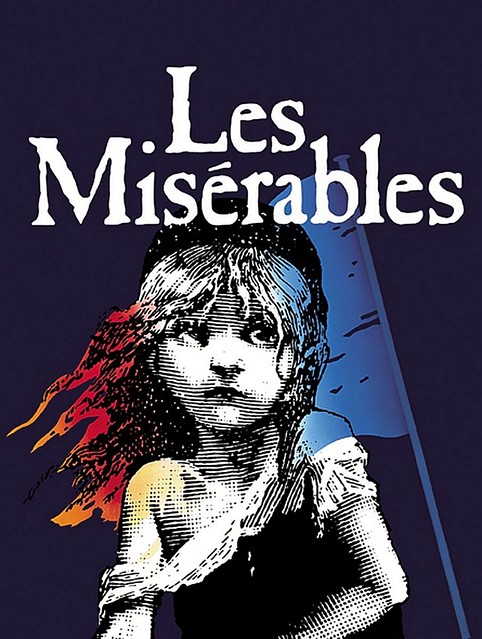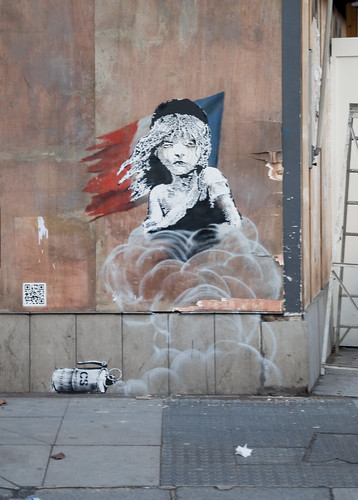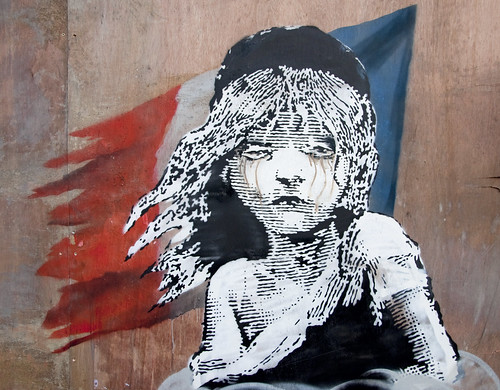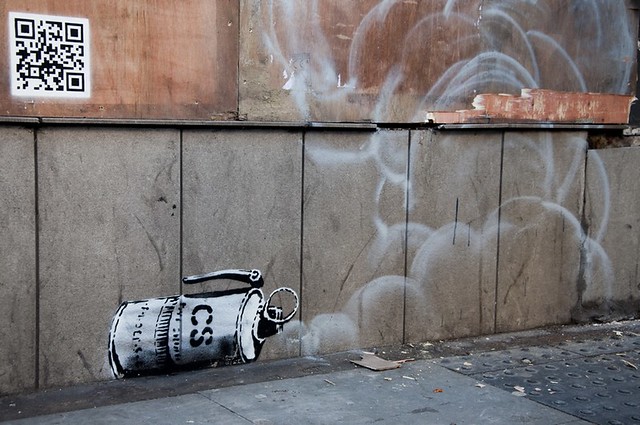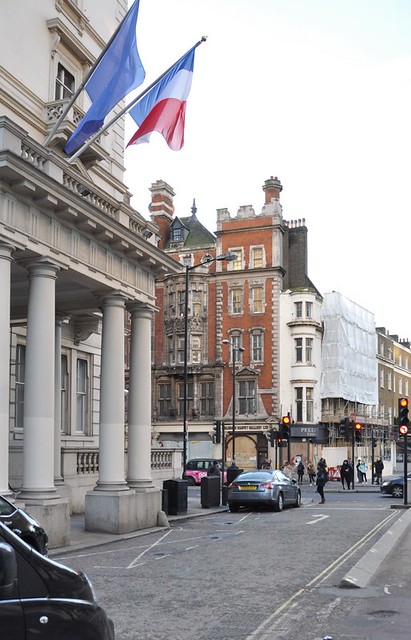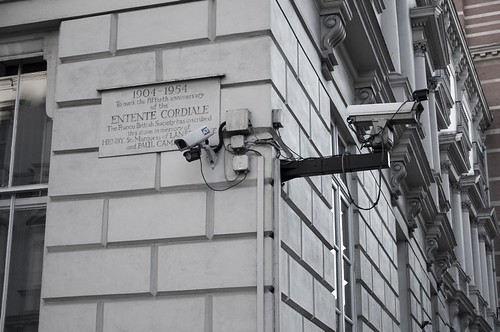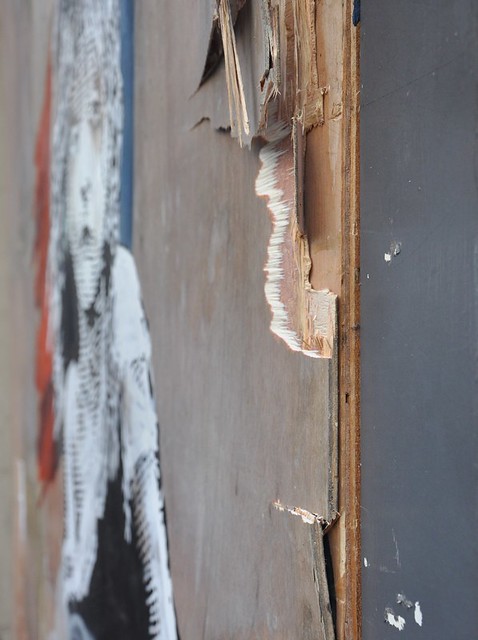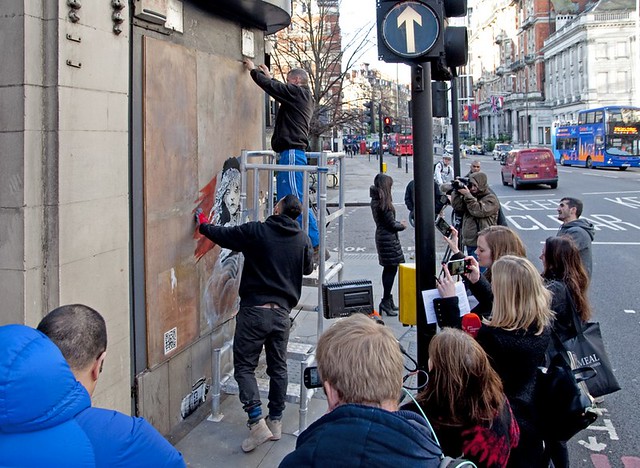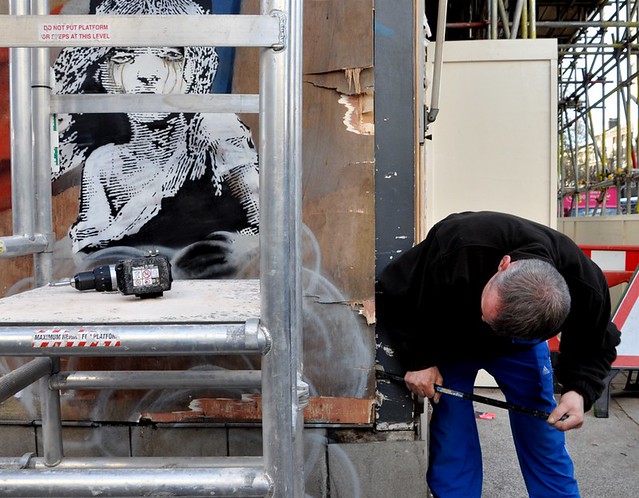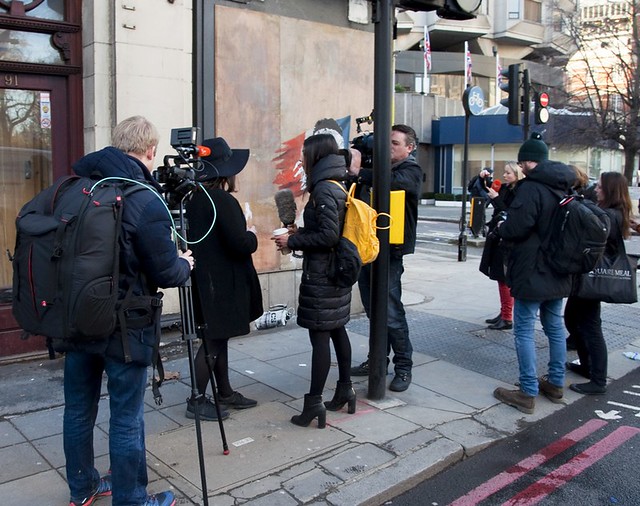News involving refugees is a daily staple, police using CS gas makes disturbingly frequent headlines, a new Banksy appearing in Central London, that IS hold-the-front-page news!
Banksy has appropriated and modified the image of Cosette, victim/heroine in les Miserables originally drawn by Émile Bayard to illustrate the first edition of Victor Hugo’s epic tragedy of doomed French democratic resistance. The addition of the French tricolour came about in the promotion of various musical versions of Les Miserables.
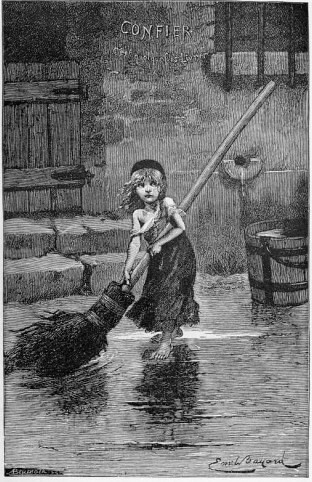
Cosette by Émile Bayard (wikipedia)
Bansky’s contemporary vesion shows an even more distressed Cosette wreathed in teargas from a CS gas canister lying at her feet.
It is hugely political as the best Banksys are and to ensure the point is not missed, Banksy has provided a QR code which directs you to 7 minutes of recent footage of French police attacking refugees with CS gas. The aerial bombardment of the camp occupants with rocket launched multi headed gas canisters drives home the senseless deprivation of basic human rights the unfortunate occupants of the refugee camp are subjected to.
The unrelenting assault doesn’t injure the camp occupants but it in the footage it becomes clear that the authority’s intention is to irritate and unsettle the occupants.
video courtesy Calais Migrant Solidarity
At one point we see a water canon being sprayed onto the occupants, echoes of a central feature at Banksy’s Dismaland there, the police’s actions just add further mess and misery to refugee’s lives.
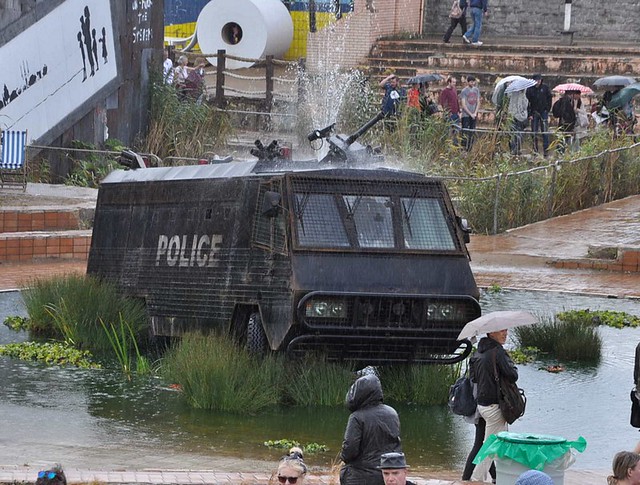
Dismaland, 2015
Attitudes to the refugees and the conditions they are forced to endure is a subject Banksy has repeatedly focussed on in the past year, he has already made several pieces in Calais relating to society’s attitudes to refugees seeking sanctuary from the war in Syria, as well as donating many materials left over from his Dismaland exhibition last year to provide shelter for displaced persons in the so called Jungle in Calais.
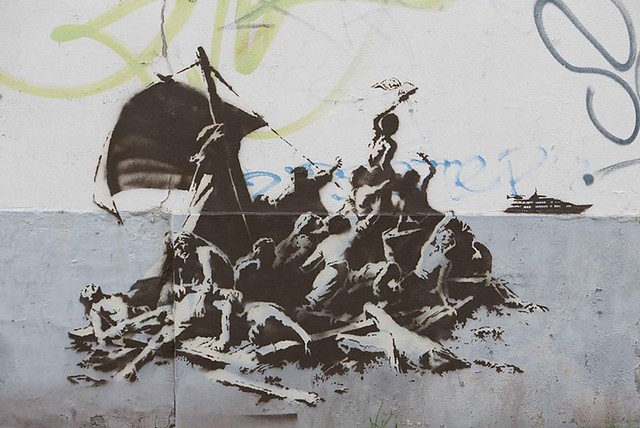
“We’re not all in the same boat”. image copyright Banksy.co.uk
A Banksy hallmark is ideal placement and this image has a wonderful context placed directly opposite the French Embassy in London. For a bit more context, the French Embassy is located in Knightsbridge, yards from Hyde Park corner and you can hardly find a swankier spot in London in which to do a little criminal damage, nor a bigger contrast with conditions in Calais Jungle.
It is directly under the gaze of a CCTV camera mounted on the French building which now points directly at the image, this raises the one question which is the mark of a great piece of street art: “how on earth did Banksy get away with doing this”. The more security there is generally the faster the creation of the street art needs to be. This Banksy piece has very complex stencilism in the portrait of Cosette, it has multiple colours, it has freehand spraypainting in the gas and it has the detached stencil element of the CS gas canister. So how did he do it?
On close inspection it becomes apparent that the plywood surface the image was painted on was a different quality ply to the plywood in the adjacent windows. T he Cosette element of the image is actually spread on two separate sheets of plywood which Banksy ADDED over the existing plywood over the window, so he turned up with that plywood pre measured, the image ready sprayed and probably with the screw holes already drilled. Saves a bit of time that!
The security guards in the Embassy opposite say someone dressed in workers clothing was seen in the middle of Saturday night creating the work but they didn’t intervene as it was someone else’s private property
We know Banksy hates his street pieces being removed from their public site and disappearing into private collections and auction houses and it is noticeable that many of his recent pieces involve placing the art onto different surfaces, ideally as in the case of the Cheltenham GCHQ piece, with multiple owners of the different component surfaces which are intrinsic to the appreciation of the whole piece.
This morning, workers renovating the premises Les Miserables is placed on were “under instructions from the Manager” removing the plywood image of Cosette but the fate of the CS gas canister was still under debate.
One little “booby trap” Banksy left the unsuspecting art heist merchants was that as well as the screws, the additional layer of plywood had been glued to the plywood below, which defeated the workers efforts to remove the top layer.
One suspects that once they have a replacement plywood sheet ready to go in they will actually remove the whole ensemble.
This raises an interesting legal question – who actually owns that added piece of plywood. We can be pretty sure Banksy won’t be too stressed about the destiny of the physical piece, his objective will be met by the newspaper, tv and internet coverage.
Earlier this week after the blog post preceding this one I emailed blog compadres HowAboutNo and Shellshock (check the records, he has posted!) and observed that our next blog post would be our 300th. Our 200th blog post was about something we felt passionately about, the ludicrous and disproportionate sentencing handed out to a graffiti writer, 10FOOT for the crime of changing the colour of some surfaces without permission. Should we mark this milestone with some kind of synopsis of stuff which had raised our ire or floated our boat street art and graffiti wise since then, or should we just wait until something cropped up to write about in the usual course of events. Well, without wishing to gloss over the political point Banksy is making with this new work, a new Banksy on our doorstep after a 3.5 year gap is pretty exciting, let’s hope we don’t wait so long for the next one. Graffoto isn’t stopping any time soon!


